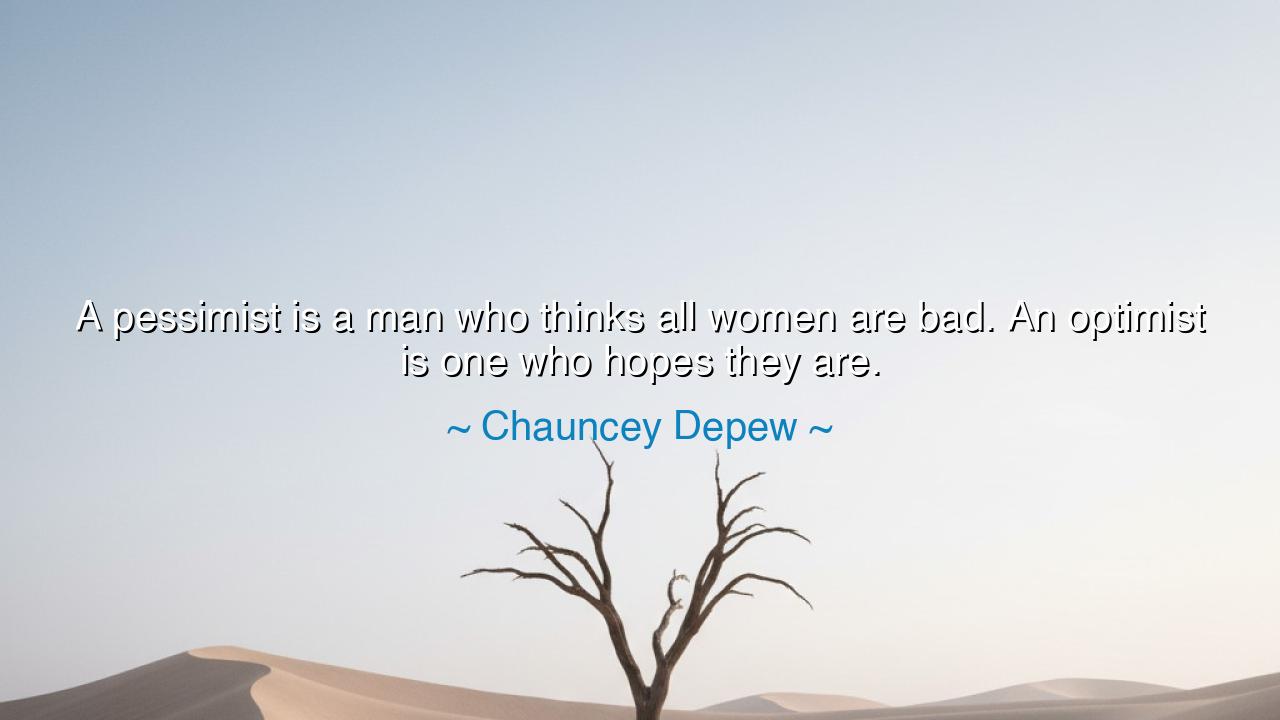
A pessimist is a man who thinks all women are bad. An optimist
A pessimist is a man who thinks all women are bad. An optimist is one who hopes they are.






Hear, O children of wit and wisdom, the playful words of Chauncey Depew: “A pessimist is a man who thinks all women are bad. An optimist is one who hopes they are.” Though draped in humor, this saying carries beneath it the ancient struggle between desire and suspicion, between cynicism and hope. It is the jest of one who recognized the power of women in shaping men’s lives, and who clothed his reflection in paradox, making light of the mystery and the danger that men have often attributed to women.
For the pessimist, all is already condemned. He sees only deceit, temptation, or frailty, and thus writes women off as a source of ruin. His world is dark, for he believes the game already lost. But the optimist, though scarcely wiser, sees in that same supposed ruin not despair but adventure. His hope lies in the thrill of possibility, the dream that women may yet fulfill the very mischief he fears. In both cases, woman is cast as powerful—whether dreaded or desired.
This paradox echoes through history. Recall the tale of Samson and Delilah, where Samson, blinded by love, found betrayal in the very arms he trusted. To the pessimist, her act proves that women bring ruin; to the optimist, her story merely confirms the intoxicating power of love, worth the risk of downfall. Depew, with his jest, reminds us that men have long seen in women both peril and promise, and often embraced both in equal measure.
The saying also reveals the folly of extremes. To condemn all women as bad is blindness, but to hope for mischief is another form of blindness—one wrapped in indulgence rather than fear. It teaches us, in its ironic way, that human beings too often create their own illusions, and then call them wisdom. The pessimist is enslaved by distrust; the optimist by desire. Both are captives of their own hearts, and women in their eyes become symbols, rather than human beings of equal dignity.
Therefore, O seekers of truth, let this jest be your lesson: the measure of wisdom is not in pessimism nor optimism, but in clarity. Women are neither saints nor snares by nature, but souls like men—capable of greatness, weakness, kindness, and cruelty. Depew’s humor is sharp, but wisdom lies in seeing beyond the joke: to honor the fullness of humanity, and not reduce it to the shadows of one’s fears or the fire of one’s hopes.






VNVi Nguyen
I find Depew’s distinction between pessimism and optimism interesting but also slightly concerning. The quote seems to imply that women's worth or character is defined by their moral standing, which feels overly reductive. Could this view be an oversimplification of the role that gender plays in how people perceive each other? How does this quote fit into modern discussions about individual agency, identity, and the way society should view women?
LAPhan Linh Anh
This quote seems to use humor to make a point about how optimism and pessimism shape our perceptions of others, but it feels a bit dated. In today’s context, isn’t it problematic to frame women in such an all-or-nothing way? Could this quote be interpreted as a critique of those who reduce complex human relationships and gender dynamics to black-and-white thinking? What might this say about the evolving conversations on gender equality and societal expectations of women?
GDGold D.dragon
Depew's quote seems to make a lighthearted attempt at describing personality traits, but it also feels problematic in its implications about women. Is it possible that it reinforces stereotypes about women being either entirely good or entirely bad? Doesn’t this reduce women to simplistic, almost caricature-like roles? How does this quote reflect broader societal views on gender and the often unrealistic expectations placed on women?
DCDiem Cao
This quote seems to play with the idea of how pessimism and optimism are often defined in extreme terms. But does the way Depew defines them oversimplify the complexity of human nature, especially in the context of gender? Is it fair to categorize all women (or people in general) into such binary categories of 'bad' or 'good'? Can optimism and pessimism be better understood in more nuanced ways, where we acknowledge both strengths and flaws?